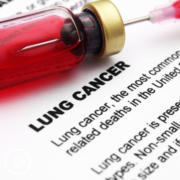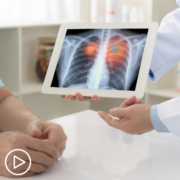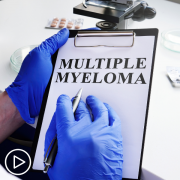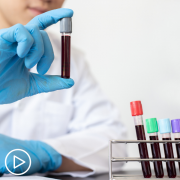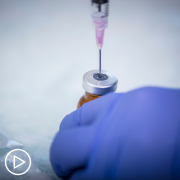Entendiendo tu rol en el cuidado de tu CLL
Entendiendo tu rol en el cuidado de tu CLL from Patient Empowerment Network on Vimeo.
Patient Empowerment Network (PEN) is a 501(c)(3) non-profit organization. PEN’s mission is to offer trusted information to empower anyone impacted by cancer, through health equity, health literacy and shared decision-making. Subscribe now to receive the latest news on cancer treatment and research: https://powerfulpatients.org/connect
Related Resources:
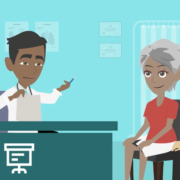
|

|

|
Transcript:
Dra. Johnson:
¡Hola! Soy la Dra. Johnson, y soy médico especializado en cánceres de sangre. Y él es Joseph, quien vive con leucemia linfocítica crónica, o CLL por sus siglas en inglés.
Y en esta serie de videos, Joseph y yo discutiremos pasos para ayudarte a aprender sobre tu diagnóstico, entender tus opciones de tratamiento y colaborar con tu equipo de atención médica en las decisiones sobre el cuidado de tu CLL.
Joseph:
Y aunque pueda sonar sencillo, colaborar con tu equipo no siempre es algo natural.
Cuando me diagnosticaron con CLL, estaba confundido, no solo sobre la enfermedad en sí sino sobre MI rol en la toma de decisiones sobre mi cuidado. No me sentía cómodo compartiendo mi opinión o haciendo preguntas cuando necesitaba más detalles.
La Dra. Johnson percibió mi vacilación y me explicó que educarme sobre mi CLL me permitiría sentirme más seguro al participar en las decisiones sobre el cuidado.
Dra. Johnson:
Así es, Joseph. El primer paso para sentirte cómodo hablando con tu médico es aprender sobre tu enfermedad.
Puedes comenzar con sitios web de grupos de defensa que tienen recursos educativos, como la Red de Empoderamiento del Paciente. PEN cubre todo sobre CLL, desde lo básico para pacientes recién diagnosticados hasta información sobre terapias de vanguardia.
Joseph:
¡Eso es cierto! Siguiendo el consejo de la Dra. Johnson, descargué sus planificadores de visitas al consultorio para ayudarme a organizar mis pensamientos y tomar notas durante mis citas.
Dra. Johnson:
Y la Sociedad de Leucemia y Linfoma es otro lugar creíble para comenzar. La LLS proporciona información educativa y recursos de apoyo.
Joseph:
También puedes pedir recomendaciones a tu médico, o usar tu portal del paciente. El portal a menudo contiene enlaces y recursos educativos para pacientes.
Dra. Johnson:
Pero ten en cuenta que la información que encuentras en línea nunca es un sustituto del consejo médico. Ten cuidado con sitios que se basan en opiniones o se centran en la experiencia individual de un paciente.
Siempre debes hablar con tu médico sobre lo que has aprendido para obtener respuestas a tus preguntas.
Joseph:
Muy cierto, Dra. Johnson. Y una vez que sentí que tenía un buen entendimiento de CLL, comencé a tomar medidas proactivas y a participar en mi cuidado. Aquí está mi consejo para otros:
- Primero, asegúrate de escribir tus preguntas y objetivos antes de tus citas. A menudo es difícil recordar cosas en el momento.
- Luego, trae a un ser querido para que participe en tus citas y tome notas. También es una buena idea discutir lo que aprendiste después de la visita. Esto te ayudará a retener la información que escuchaste.
- Además, intenta superar tus miedos de “molestar a tu médico”: sé honesto sobre cómo te sientes. Es especialmente importante mencionar cualquier síntoma o efecto secundario porque esto puede tener un impacto directo en tu cuidado. Recuerda, tu médico no puede resolver un problema a menos que le digas lo que está sucediendo.
- Y si estás tomando estos pasos y aún no sientes que te escuchan, deberías considerar obtener una segunda opinión o incluso cambiar de médico.
Dra. Johnson:
Ese es un gran consejo, Joseph: siempre deberías sentir que estás en el centro de tu cuidado. Esperamos que este video te inspire a colaborar en tu cuidado.
Y, no olvides descargar la guía de recursos que acompaña a este video; proporciona un resumen de la información que cubrimos.
Joseph:
También puedes visitar powerfulpatients.org/CLL para ver más videos con la Dra. Johnson y conmigo. ¡Gracias por unirte a nosotros!




